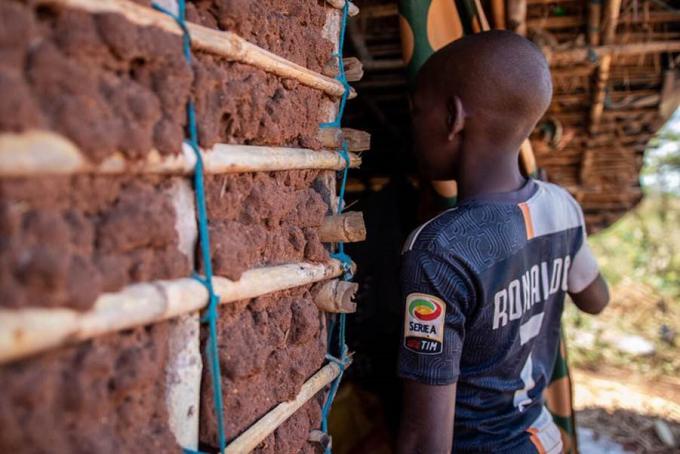Number of lone children fleeing conflict in Cabo Delgado jumps 40% in one month
Pemba, 9 August: The number of unaccompanied or separated children fleeing Cabo Delgado for resettlement centres in Montepuez increased by 40% in July, according to new data from Save the Children.
The increase, from 395 children at the end of June to 550 at the end of July, highlights the devastating impact of the ongoing conflict in Mozambique on children, the organisation said.
Save the Children’s child protection staff registered an average of five unaccompanied or separated children1 per day arriving in camps last month. Many of these children were separated from their parents or caregivers while fleeing for their lives during the conflict. Others had lost parents to the violence.

On the eve of the Southern African Development Community (SADC) Summit of Heads of State and Government in Malawi, where the situation in Cabo Delgado will be at the forefront of discussions, Save the Children is calling on regional leaders to ensure that any regional response to the crisis takes into account the urgent and life-threatening needs of displaced children.
Save the Children is gravely concerned for the mental and physical wellbeing of the hundreds of unaccompanied and separated children in Cabo Delgado. Separated children face enormous challenges in meeting their basic needs, lacking the people in their lives who would usually help them find food, water, and shelter.
One such child, Luis*, 14, has been living with his neighbour Andre*, 71, after his father was murdered in the conflict and he was separated from his mother and sister.
Luis told Save the Children:
“I was living with my father and mother. The armed men killed my father. Here [in the resettlement camp], I’m in grade six. I would like to be supported with school materials and I would like a bike to ride to school because it’s far away. We would also like food because sometimes we don’t have enough food.”
Save the Children staff have managed to reunite 63 children with their parents or primary caregivers, while the remaining children are being hosted by foster families or in other forms of temporary accommodation.
Over 336,000 childrenhave been displaced by the conflict in Cabo Delgado, which continues to deteriorate in the northern province of Mozambique. In the last week of June alone, almost 5,000 people moved from Palma to other districts as a result of the conflict. At least 1,461 people have died as the result of direct civilian targeting, including an unknown number of children. At least 51 children, most of them girls, have been abducted over the past 12 months.
Save the Children has been providing child protection programming, including family tracing and reunification, and mental health and psychosocial support for separated and unaccompanied children, as well as child victims of abuse, and those showing signs of profound traumatic impacts.
Chance Briggs, Save the Children’s Country Director in Mozambique, made this statement to regional and global leaders:
“The crisis in Cabo Delgado is a children’s crisis. As such the needs of children must be front and centre of any regional response. These children rely on the adults in their lives – including their political leaders – to protect them. Luis’ story is like that of hundreds of others, a story of displacement, loss, and need.
“We call on all parties to this conflict, including the newly arrived international forces, to ensure that children are protected in Cabo Delgado. All actors must respect international humanitarian and human rights laws and take all necessary actions to minimise incidental civilian harm. Greater monitoring must also take place of any violations, including through the Office of the UN Special Representative of the Secretary-General for Children in Armed Conflict mechanism, so that the perpetrators of violence against children can be held to account.
“We look forward to working with SADC leaders and all other actors to ensure the children of Cabo Delgado have the future they are entitled to.”
Save the Children is also calling on international donors to increase funding to the humanitarian response in Cabo Delgado. There remains a US $66 million funding gap between the needs identified and the amount committed by global actors. This gap means less protection services for vulnerable children, less mental health support for children who have experienced or witnessed horrific events, and less food and water to keep children healthy.
Save the Children is responding to the crisis in Cabo Delgado, providing lifesaving and life-sustaining assistance to affected communities and families, reaching more than 210,000 people as of 30 June 2021, including over 111,000 children, through Protection, Education, WASH and non-food items (NFIs), Health, and Food Security & Livelihoods (FSL) programs.
*Name changed to protect identity
Notes:
- An unaccompanied child is a child who is separated from his/her family and is totally alone. A separated child is a child who is separated from parents or guardians, but are accompanied by either community members, friends or members of the extended family.
Content:
Luis* (14) and Andre* (71) – UAC and violence
- Case study and photos
- https://www.contenthubsavethechildren.org/Share/8itec35580b0xq6ga3p5f1wuj3606y8x
 Mozambique
Mozambique